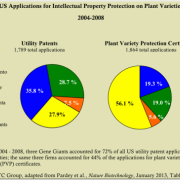South Africa exports ‘unapproved’ GM maize to Zimbabwe, continues to export to Mexico, contaminating both the region and centre of origin
Enviado por ETC Staff el
African Centre for Biosafety, ETC Group, FoodMattersZimbabwe and CTDT
Johannesburg, Harare, Mexico City 15 April 2013
Maíz transgénico de Sudáfrica: imposición en México y Zimbawe
Enviado por ETC Staff el
BOLETÍN DE PRENSA
Grupo ETC, Centro Africano para la Bioseguridad,
FoodMattersZimbabwe y CTDT
Johannesburgo, Harare y Ciudad de México 15 de abril de 2013
Nuevas importaciones de maíz transgénico de Sudáfrica a México
Cargamentos no autorizados hacia Zimbawe
En peligro el centro de origen y las formas de vida campesinas del maíz en Mesoamérica y en África
Tunis 2013: If we rely on corporate seed, we lose food sovereignty
Enviado por Joëlle Deschambault el
GROWING POWER IN PEASANT SEEDS SYSTEMS: Farmers seeds and struggle against GMOs, AGRA- 2nd Green Revolution. Tunis, March 29.
It has become crucial to defend seeds. In the past 20 or 30 years, what was once seen as normal – peasant farmers growing, selecting, saving and exchanging seeds – has come under attack from corporations seeking to control and commodify the very basis of agriculture.
Gene Giants Seek "Philanthrogopoly"
Enviado por ETC Group el
A report released today by ETC Group warns that 6 multinational Gene Giants control the current priorities and future direction of agriculture research worldwide. Syngenta, Bayer, BASF, Dow, Monsanto and DuPont control 59.8 % of commercial seeds and 76.1 % of agrochemicals. The same 6 companies account for at least 76 % of all private sector R&D in these two sectors.
Amid unprecedented corporate concentration, ETC Group’s report provides a critical look at new initiatives launched by the Gene Giants – including the false promise of cheap, post-patent GE seeds – aiming to appease antitrust regulators and pass off oligopolistic practices as acts of charity. Meanwhile, the world’s two richest men – Bill Gates and Mexico’s Carlos Slim – are teaming up with CIMMYT (the international public maize and wheat breeding center based in Mexico) to get bargain GE seeds and traits in the hands of farmers in the global South.
Continúa alarma por maíz transgénico
Enviado por ETC Staff el
México permanece en alerta roja ante los intentos de Monsanto y otras trasnacionales agrícolas por lograr la aprobación del gobierno a la siembra de 2.5 millones de hectáreas de maíz transgénico en el centro de origen y diversidad del cultivo. Como informó el Grupo ETC el mes pasado, aprobar estas solicitudes pondría en grave peligro a la biodiversidad, los derechos campesinos y recursos vitales para enfrentar el cambio climático. Aunque la administración de Felipe Calderón no pudo dar luz verde a las solicitudes antes de dejar el cargo el 30 de noviembre, hizo cambios de último minuto a diversos procedimientos regulatorios para dejar abierto el camino para que el nuevo gobierno pueda otorgar los permisos solicitados por las transnacionales.
Dentro y fuera de México, miles de voces han denunciado el ataque dirigido al corazón de las culturas mexicanas, a la alimentación, a la salud y a la naturaleza. Desde mediados de noviembre, se han organizado talleres y reuniones públicas en torno a esta “alerta transgénica”, así como peticiones nacionales e internacionales, protestas de campesinos, artistas, activistas y científicos que circulan en redes sociales, en prensa escrita y radial. La Vía Campesina, GRAIN y el Grupo ETC dirigieron una carta abierta a la Organización para la Agricultura y la Alimentación (FAO) y al Convenio sobre Diversidad Biológica (CDB), demandando a estas agencias de Naciones Unidas su intervención en bien de la seguridad alimentaria global.
Páginas
Recent Blogs
Nano Risk Governance
Enviado por Kathy Jo Wetter el
While some ETC Group staff were in Caracas strategizing with partners to strengthen the global opposition to Terminator, others of us were subjected to the slog of the CBD meeting in Granada. And one of us was spending a few days with unlimited access to free chocolate at Swiss Re's opulent Centre for Global Dialogue near Zurich. Swiss Re, the world's largest re-insurer (an insurer of insurance companies) is concerned - no surprise - about those risks associated with nanotechnology that may result in financial losses for the company.
X prize-ing open the genome for $$$
Enviado por Jim Thomas el
Not content with heading for the stars, the corporate sponsored X-Foundation that awards the X-prize has now set a bounty for commericalising the neXt frontier - the human genome. According to this article in the Wall Street Journal the X-foundation will award a new X-prize of between $5-$20 million to the first inventor of a gene sequencer that can decode the DNA of 100 people in a matter of weeks. behind it is craig venter, the genomics mogul.
Terminator Technology Debated
Enviado por Charlie el
Two of us from ETC are in Granada, Spain following the Working Group on 8j the CBD body that has the mandate to recognize and protect the traditional knowledge, innovation and practices of indigenous peoples. By the end of the week, the Working Group on 8(j) will make recommendations to COP8 (Curitiba, Brazil, March) on the social and economic impacts of Terminator. Heres a brief round-up of government interventions (just the highlights) in yesterdays working group.
What next? disagreements?
Enviado por Jim Thomas el
Some of us at ETC have just spent the past three days in a drafting group for the Dag Hammarskjold Foundation's inspiring What Next? project. Hopefully we will write more about What Next? as it gets closer to completion. Briefly the What Next? project its an attempt to stop, reflect and look forward to the challenges and issues Civil Society faces in the coming thirty years. How will we organise ourselves? what new global trends will we be leading or responding to?
Pharmanoia?
Enviado por Kathy Jo Wetter el
In an article appearing in this months issue of Nature Biotechnology, Dr. Henry I. Miller declares that activism against the pharmaceutical industry is driven by Paranoia and overlooks Pharmas systemic ills.
New Year. New Blog. New Articles.
Enviado por Jim Thomas el
Welcome to our ETC Blog - an occassional space for analysis, links and flagging up some of the more interesting stuff that ETC staff are reading, writing and thinking about on a day to day basis.



